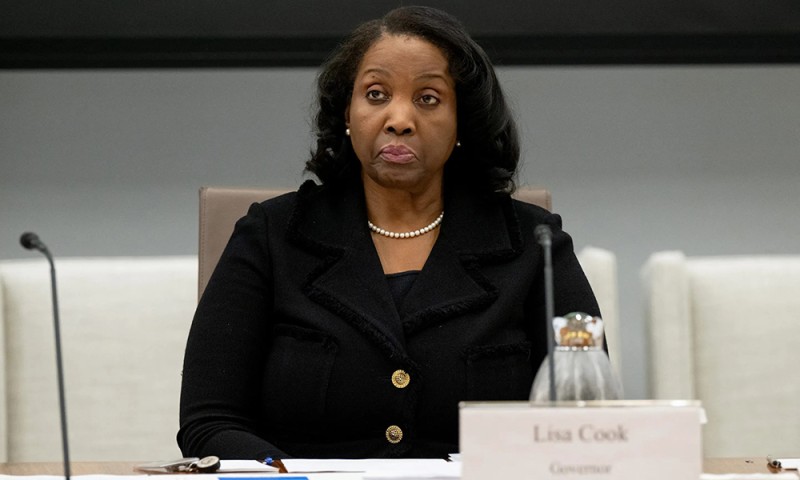
特朗普解雇美联储理事库克,引发了一场围绕央行独立性的法律对决。但至少在华尔街,一些投资者并不担心制度规范受损,反而对未来融资成本下降的前景感到振奋。
“这是非常利好的消息,”基础设施资本顾问公司(Infrastructure Capital Advisors)首席执行官杰伊·哈特菲尔德(Jay Hatfield)在接受《财富》采访时表示。“简单来说,消除美联储的无能远比捍卫所谓的美联储独立性更重要。美联储一向政治化,只是特朗普把它说到了台面上。”
事实上,市场对这一消息反应平淡,这令一些经济学家感到困惑。《金融时报》Alphaville专栏作家罗宾·维格尔斯沃思(Robin Wigglesworth)直言,市场表现出“令人难以置信的乐观情绪”。
“对制度诚信根深蒂固的期望如今已经荡然无存,”维格尔斯沃思写道。
周二早盘标普500指数和道琼斯指数基本持平,而纳斯达克指数甚至微涨0.3%。特朗普此举后,长期美债收益率上升而短期收益率下滑,导致收益率曲线趋陡,表明投资者押注利率在短期内可能下降,但若政治化的美联储减少对通胀的关注,长期利率将逐步走高。美元指数则下跌0.3%。
在哈特菲尔德看来,这正是问题所在。他认为美联储现行货币政策过于紧缩,当前政策利率“较中性水平高出150个基点”,意味着货币政策对经济增长的抑制过度。
“如果联邦基金利率在3%,而总统要求大幅降息,那才会十分危险,”他说。“但目前远未达到那种境地。”
特朗普已提名斯蒂芬·米兰(Stephen Miran)接替本月早些时候宣布辞职的理事,如果再成功替换库克,加上此前任命的米歇尔·鲍曼(Michelle Bowman)和克里斯托弗·沃勒(Christopher Waller),特朗普将拥有四个理事席位。这将使七人组成的美联储理事会形成共和党占多数的局面。
哈特菲尔德认为,共和党占主导的美联储理事会将推动降息。
“关税就像一次性税收——它在消费者物价指数(CPI)中出现一次便消失,”他说。
哈特菲尔德补充道,沃勒和鲍曼在上月维持利率不变的决议中投反对票时,就明白关税并非持续性通胀推手。相反,由民主党任命的理事却对此认识不足,导致他们“推迟降息并使经济置于风险之中”。
“所以,摆脱鲍威尔领导下的美联储,对股市和债市都是非常利好的消息,”他说。
短期内,哈特菲尔德预计今年至少会有两次降息,与美联储主席杰罗姆·鲍威尔(Jerome Powell)近期释放的鸽派信号相呼应。
“昨夜债市遭到抛售,但如果降息成真,那对债市和股市都是重大利好,”他说。
独立性岌岌可危,市场护栏脆弱难支
其他经济学家则远不如此乐观。布鲁金斯学会(Brookings)学者大卫·韦塞尔(David Wessel)警告称,特朗普“似乎决心掌控美联储——并将动用一切手段争取多数席位”,他称这是削弱民主根基的又一举动。
投行派杰(Piper Sandler)的分析师同样直言,如果投资者认为市场会约束特朗普,那就是自欺欺人。
“凭什么相信所谓的债券义勇军会在危机来临前警告国会?”他们写道,并指出市场既未预见到2022年的通胀冲击,也未预见到全球金融危机前的楼市崩盘。相反,他们认为,股市上涨完全是基于降息预期,“哪怕其中部分动力来自政治压力”。
分析师所强调的更大风险在于制度结构。分析师吉姆·比安科(Jim Bianco)在X平台上解释称,美联储七位理事必须在2026年2月12位地区联储行长五年任期届满时,重新批准或否决所有任命。
随着更多特朗普提名者进入理事会,即便是芝加哥联储主席奥斯坦·古尔斯比(Austan Goolsbee)或纽约联储主席约翰·威廉姆斯(John Williams)这样的核心人物,也可能面临职位不保,从而重塑联邦公开市场委员会(FOMC)的力量格局。
派杰警告称,“长期牛市支柱正逐一被拆除”,自由贸易格局遭逆转,而“稳健货币支柱也正遭到根本性削弱”。他们总结道,市场难以制衡美联储的政治化趋势。
目前市场仍聚焦于短期宽松政策。
瑞银全球财富管理(UBS Global Wealth Management)策略师乌尔丽克·霍夫曼-布查尔迪(Ulrike Hoffmann-Burchardi)在给客户的报告中表示,她的团队仍预期美联储将在接下来的四次会议中累计降息100个基点。
“我们将持续关注美联储面临的政治压力不断加剧的态势,”她写道,“但预计短期内其决策仍将以其使命为指引。”
至于哈特菲尔德,他对所谓的“独立性”并不在意。
“通胀已经得到控制,劳动力市场正在走弱,而我们正走向衰退,”他说。“真正的问题不在于特朗普对阵美联储,而在于美联储数十年来的无能,市场对此早已心知肚明。任何扭转局面的举措,都是利好。”(*)
译者:刘进龙
审校:汪皓
特朗普解雇美联储理事库克,引发了一场围绕央行独立性的法律对决。但至少在华尔街,一些投资者并不担心制度规范受损,反而对未来融资成本下降的前景感到振奋。
“这是非常利好的消息,”基础设施资本顾问公司(Infrastructure Capital Advisors)首席执行官杰伊·哈特菲尔德(Jay Hatfield)在接受《财富》采访时表示。“简单来说,消除美联储的无能远比捍卫所谓的美联储独立性更重要。美联储一向政治化,只是特朗普把它说到了台面上。”
事实上,市场对这一消息反应平淡,这令一些经济学家感到困惑。《金融时报》Alphaville专栏作家罗宾·维格尔斯沃思(Robin Wigglesworth)直言,市场表现出“令人难以置信的乐观情绪”。
“对制度诚信根深蒂固的期望如今已经荡然无存,”维格尔斯沃思写道。
周二早盘标普500指数和道琼斯指数基本持平,而纳斯达克指数甚至微涨0.3%。特朗普此举后,长期美债收益率上升而短期收益率下滑,导致收益率曲线趋陡,表明投资者押注利率在短期内可能下降,但若政治化的美联储减少对通胀的关注,长期利率将逐步走高。美元指数则下跌0.3%。
在哈特菲尔德看来,这正是问题所在。他认为美联储现行货币政策过于紧缩,当前政策利率“较中性水平高出150个基点”,意味着货币政策对经济增长的抑制过度。
“如果联邦基金利率在3%,而总统要求大幅降息,那才会十分危险,”他说。“但目前远未达到那种境地。”
特朗普已提名斯蒂芬·米兰(Stephen Miran)接替本月早些时候宣布辞职的理事,如果再成功替换库克,加上此前任命的米歇尔·鲍曼(Michelle Bowman)和克里斯托弗·沃勒(Christopher Waller),特朗普将拥有四个理事席位。这将使七人组成的美联储理事会形成共和党占多数的局面。
哈特菲尔德认为,共和党占主导的美联储理事会将推动降息。
“关税就像一次性税收——它在消费者物价指数(CPI)中出现一次便消失,”他说。
哈特菲尔德补充道,沃勒和鲍曼在上月维持利率不变的决议中投反对票时,就明白关税并非持续性通胀推手。相反,由民主党任命的理事却对此认识不足,导致他们“推迟降息并使经济置于风险之中”。
“所以,摆脱鲍威尔领导下的美联储,对股市和债市都是非常利好的消息,”他说。
短期内,哈特菲尔德预计今年至少会有两次降息,与美联储主席杰罗姆·鲍威尔(Jerome Powell)近期释放的鸽派信号相呼应。
“昨夜债市遭到抛售,但如果降息成真,那对债市和股市都是重大利好,”他说。
独立性岌岌可危,市场护栏脆弱难支
其他经济学家则远不如此乐观。布鲁金斯学会(Brookings)学者大卫·韦塞尔(David Wessel)警告称,特朗普“似乎决心掌控美联储——并将动用一切手段争取多数席位”,他称这是削弱民主根基的又一举动。
投行派杰(Piper Sandler)的分析师同样直言,如果投资者认为市场会约束特朗普,那就是自欺欺人。
“凭什么相信所谓的债券义勇军会在危机来临前警告国会?”他们写道,并指出市场既未预见到2022年的通胀冲击,也未预见到全球金融危机前的楼市崩盘。相反,他们认为,股市上涨完全是基于降息预期,“哪怕其中部分动力来自政治压力”。
分析师所强调的更大风险在于制度结构。分析师吉姆·比安科(Jim Bianco)在X平台上解释称,美联储七位理事必须在2026年2月12位地区联储行长五年任期届满时,重新批准或否决所有任命。
随着更多特朗普提名者进入理事会,即便是芝加哥联储主席奥斯坦·古尔斯比(Austan Goolsbee)或纽约联储主席约翰·威廉姆斯(John Williams)这样的核心人物,也可能面临职位不保,从而重塑联邦公开市场委员会(FOMC)的力量格局。
派杰警告称,“长期牛市支柱正逐一被拆除”,自由贸易格局遭逆转,而“稳健货币支柱也正遭到根本性削弱”。他们总结道,市场难以制衡美联储的政治化趋势。
目前市场仍聚焦于短期宽松政策。
瑞银全球财富管理(UBS Global Wealth Management)策略师乌尔丽克·霍夫曼-布查尔迪(Ulrike Hoffmann-Burchardi)在给客户的报告中表示,她的团队仍预期美联储将在接下来的四次会议中累计降息100个基点。
“我们将持续关注美联储面临的政治压力不断加剧的态势,”她写道,“但预计短期内其决策仍将以其使命为指引。”
至于哈特菲尔德,他对所谓的“独立性”并不在意。
“通胀已经得到控制,劳动力市场正在走弱,而我们正走向衰退,”他说。“真正的问题不在于特朗普对阵美联储,而在于美联储数十年来的无能,市场对此早已心知肚明。任何扭转局面的举措,都是利好。”(*)
译者:刘进龙
审校:汪皓
President Donald Trump’s attempt to fire Federal Reserve governor Lisa Cook has triggered a legal showdown over the central bank’s independence. But on Wall Street at least, some investors aren’t worried about institutional norms; instead, they’re excited about the prospect of cheaper money over time.
“This is very positive,” Jay Hatfield, CEO of Infrastructure Capital Advisors, told Fortune. “The simple way to say it is that eliminating Fed incompetence is far more important than defending alleged Fed independence. The Fed has always been political; it’s only Trump who talks about it in public.”
Indeed, markets largely shrugged off the announcement, to the bewilderment of some economic experts: Robin Wigglesworth of FT Alphaville argued markets are being “preposterously sanguine.”
“Entrenched expectations of institutional integrity are now kaput,” Wigglesworth wrote.
The S&P 500 and Dow traded around the flat line Tuesday morning, while the Nasdaq even gained 0.3%. Long-term Treasury yields rose after the Trump move, while short-term yields slipped, steepening the curve, indicating that investors are betting rates may fall in the near term but drift higher if a politicized Fed proves less attentive to inflation. The U.S. dollar index was down 0.3%.
For Hatfield, that’s the point. He argued the Fed is already too tight, with policy rates sitting “150 basis points above neutral,” meaning monetary policy is restraining growth more than it should.
“If Fed funds were at 3% and the president was pushing for big cuts, that would be dangerous,” he said. “But we’re nowhere near that.”
Trump already nominated Stephen Miran to the Fed board after one governor decided to step down earlier this month, so replacing Cook would give him a fourth voice alongside earlier appointees Michelle Bowman and Christopher Waller. That would tilt the seven-member Board of Governors toward a Republican-leaning majority.
The prospect of a Republican-leaning Fed board is one reason Hatfield thinks cuts are coming.
“A tariff is like a one-time tax—it shows up in CPI once and then disappears,” he said.
Waller and Bowman, who both dissented in last month’s decision to hold rates steady, understand that tariffs aren’t a persistent inflation driver, Hatfield added. On the other hand, Democratic-appointed governors misunderstand that, causing them to “delay cuts and put the economy at risk.”
“So getting rid of the Powell Fed is very positive for the stock market and the bond market,” he said.
In the short term, Hatfield expects at least two cuts this year, echoing Fed Chair Jerome Powell’s recent dovish signals.
“Overnight you saw a knee-jerk selloff in bonds, but if we’re going to get cuts, that’s great for bonds and great for stocks,” he said.
Independence at risk, with only fragile guardrails from the market
Other economic experts are far less optimistic. David Wessel of Brookings warned Trump “seems determined to control the Fed—and will use any lever he has to get a majority,” calling it another step in undermining democratic foundations.
Analysts at investment bank Piper Sandler were equally direct, arguing investors are deluding themselves if they think markets will discipline Trump.
“What is the basis for believing the so-called bond vigilantes will scold Congress before a crisis is at hand?” they wrote, pointing out markets didn’t foresee the inflation shock of 2022 or the housing bust before the Global Financial Crisis. Instead, they argued, stocks are simply rallying at the prospect of rate cuts, “even if they may come in part due to political pressure.”
The bigger risk the analysts are pointing to is structural. As analyst Jim Bianco explained on X, the Fed’s seven governors must reapprove—or veto—all 12 regional Federal Reserve Bank presidents when their five-year terms expire in February 2026.
With more Trump appointees on the board, even leaders like Austan Goolsbee in Chicago or John Williams in New York could find their jobs at risk, reshaping the balance of the FOMC.
Piper Sandler warned the “pillars of the long bull market are being removed one by one,” with freer trade reversed and “the sound money pillar in the process of being fundamentally compromised.” The market, they concluded, is unlikely to serve as a check on the politicization of the Fed.
For now, the markets are focused on near-term easing.
UBS Global Wealth Management strategist Ulrike Hoffmann-Burchardi told clients that her team still expects the Fed to deliver 100 basis points of cuts over the next four meetings.
“We will continue to monitor rising political pressure on the Fed,” she wrote in a note, “but expect its decision-making to remain guided by its mandate in the near term.”
Hatfield, for his part, is unconcerned about what he calls “alleged independence.”
“Inflation is already contained, the labor market is weakening, and we’re headed into recession,” he said. “The real story isn’t Trump versus the Fed—it’s that the Fed has been incompetent for decades, and markets know it. Any step toward fixing that is positive.”

